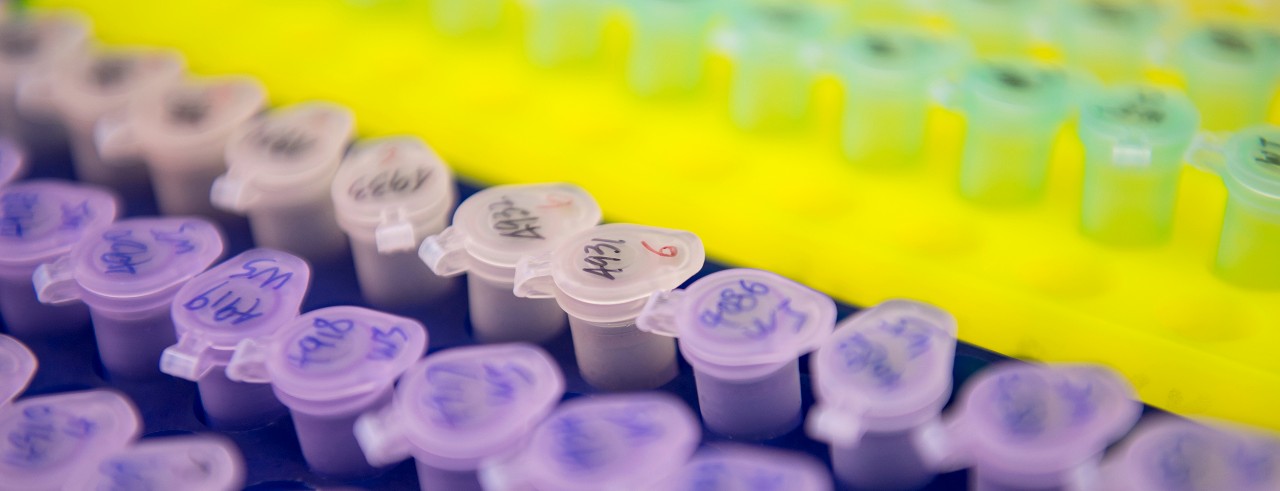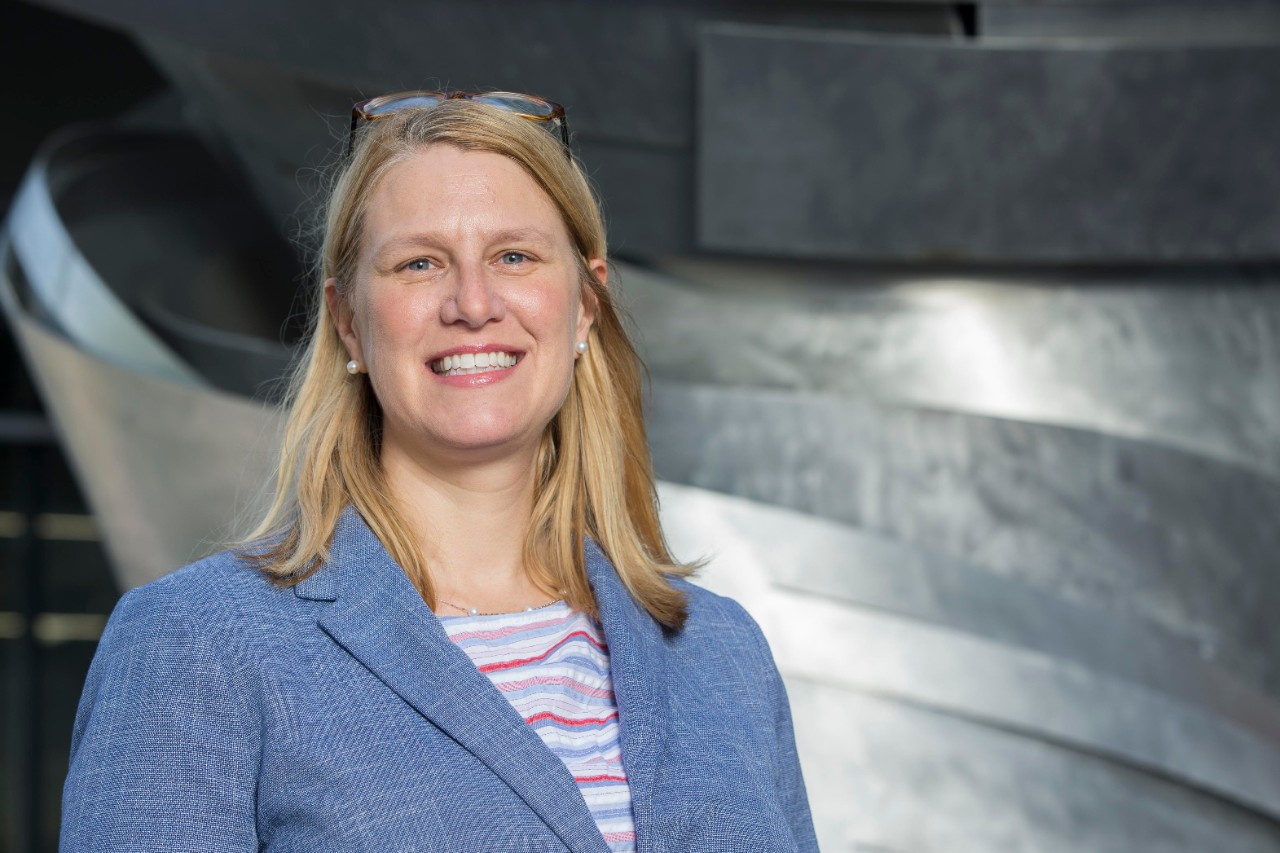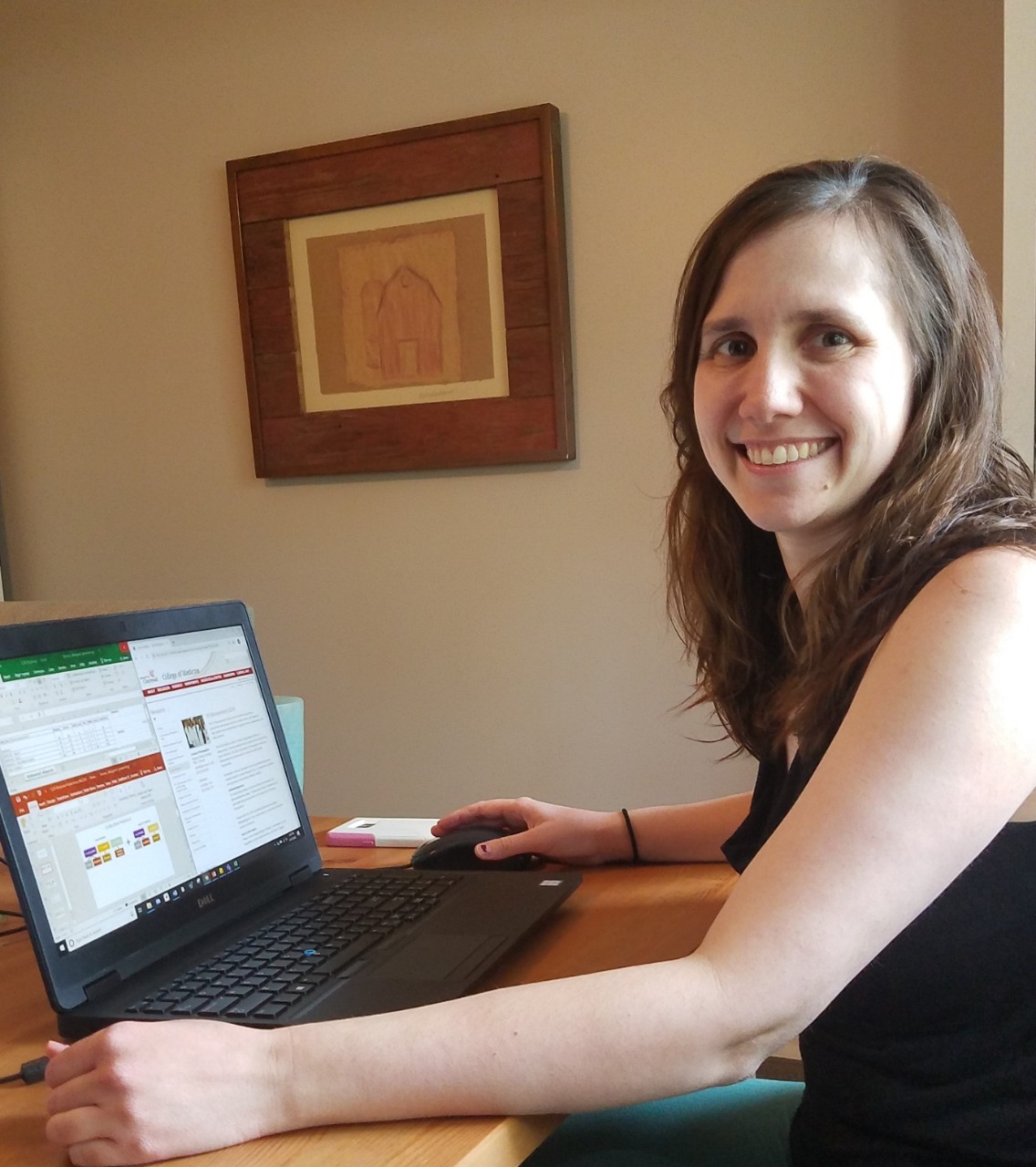
UC, UC Health establish biorepository to collect samples from COVID-19 patients
Researchers hope to learn more about causes and possible treatments for this and other diseases
The University of Cincinnati College of Medicine and UC Health are collecting specimens from COVID-19 patients to be stored as part of the Cincinnati COVID-19 Repository (CCR) effort. The specimens will be used by researchers to learn more about COVID-19 and possible treatments and preventions for not only this disease but possibly diseases of the future.
The concept of a repository came together in the latter days of March from discussions among researchers across UC, Cincinnati Children’s Hospital Medical Center and other organizations, according to Dr. Kristin Hudock of the Department of Pulmonary, Critical Care and Sleep Medicine at the UC College of Medicine.

Dr. Kris Hudock, overseeing the COVID-19 biorepository at the UC College of Medicine. Photo/Joe Fuqua II/UC Creative + Brand
“There was a growing consensus that we needed samples from these patients,” Hudock says. “There was a call amongst investigators across the entire campus including Cincinnati Children’s, UC and the Cincinnati Veteran’s Affairs Medical Center (VAMC) that we need to get specimens so that we can ask key scientific questions. We had multiple people with very different backgrounds who had never met each other and suddenly we had a unifying goal of ‘we’ve got to figure this out.’ It was a call to arms.”
The collection of biological specimens from consenting COVID-19 patients began in mid-April and are stored in the UC Biorepository (UCB), a biospecimen procurement and storage core facility located in the UC College of Medicine. Under the direction of Kelsey Dillehay McKillip, PhD, the UCB provides biospecimen collection, processing and storage services in support of clinical and translational research. All of the CCR specimens will be stored within the UCB, and the UCB staff will be responsible for maintaining the integrity and organization of the specimens.
“We’ve rallied as a medical center to say we should have a singular path where we gather all of the specimens and data as best we can into one pool, then share it across the organization,” says Dr. Brett Kissela, the Albert Barnes Voorheis chair and professor of the UC Department of Neurology and Rehabilitation Medicine, senior associate dean for clinical research at the UC College of Medicine and chief of research services for UC Health. “We’re going to be taking care of these patients, and we have no way to intervene right now. So if nothing else, we should be able to gather data and learn something about our patients from this disease process to give us some clues that might lead to future treatment.”
The research is just one prime example of the university’s commitment to urban impact, one of the pillars of UC’s strategic direction, Next Lives Here.

Maggie Powers-Fletcher working from home as she oversees the laboratory aspect of the COVID-19 biorepository
The goal for the CCR is to collect as many specimens as possible, according to Maggie Powers-Fletcher, PhD, assistant professor of the UC Division of Infectious Diseases. Powers-Fletcher, who has a background in clinical microbiology and laboratory medicine, oversees the laboratory aspect of this project and helps with coordination between the many groups involved.
“The biospecimens will allow us to have samples to test and explore different hypotheses to look at the different disease mechanisms involved, and then when we compare that or associate that with the clinical data and exposure data, we can start to understand the epidemiology of this,” says Powers-Fletcher. “A lot of this is understanding how to respond, how to predict and how to manage this type of disease from all aspects. We’re hoping to create a database that will allow a multidirectional approach.”
According to Kissela, the CCR is made possible by funding from the University of Cincinnati Office of Research along with matching funds from Cincinnati Children’s Hospital and the UC College of Medicine who all came together in a rapid fashion to initiate the project.
“Institutions often take six months to actually launch something like this with adequate funding. It’s unprecedented to launch this within four weeks of the conceptual idea, with funding, multiple institutions and cooperation of an entire academic health campus, with buy-in and so many investigators coming together to make it happen,” says Dr. Carl Fichtenbaum, professor in the UC Division of Infectious Diseases and associate chairman of translational research. “This is very unheard of, and it’s a tribute and a testament to the entire UC family that we were able to do this.”
In all, more than 60 groups of scientists and clinicians will utilize these patient samples across the campus. That number includes people from Cincinnati Children’s, the Cincinnati VAMC and other areas of UC such as the Department of Environmental and Public Health Sciences and the College of Engineering and Applied Science who will apply their expertise to studying the SARS-CoV-2 related disease. This includes scientists and clinicians who make vaccines, those trying to selectively quell the inflammation and those trying to prevent respiratory failure and sudden cardiac death.
“The biggest question we hope to answer is why some people have minor symptoms while others become critically ill and require mechanical ventilation,” says Hudock. “I have been caring for these patients in the MICU and asking myself: Do these patients have a genetic predisposition? Is this the result of an overly exuberant immune response? Studies done with biorepository samples offer a unique opportunity to predict who will need the ICU and allow us to focus our energies and resources.”
Powers-Fletcher says from her perspective as a scientist and researcher, she hopes this pandemic is a once-in-a-generation experience, but it is also an opportunity to better prepare for the future.
This research is just one example of several research projects being conducted by UC scientists in response to COVID-19. For a comprehensive look at those projects, click here.
Impact Lives Here
The University of Cincinnati is leading public urban universities into a new era of innovation and impact. Our faculty, staff and students are saving lives, changing outcomes and bending the future in our city's direction. Next Lives Here.
Stay up on all UC's COVID-19 stories, read more #UCtheGood content, or take a UC virtual visit and begin picturing yourself at an institution that inspires incredible stories.
Related Stories
UC engineering students recognized for achievement in...
May 1, 2025
Sixteen UC engineering students were honored for outstanding achievement in cooperative education at the close of the 2024-2025 school year.
Everything you need to know about scents and your hair
May 1, 2025
The University of Cincinnati's Kelly Dobos was featured in an NBC News article discussing the science behind hair fragrances and shampoos.
Machine learning brings new insights to cell’s role in...
April 30, 2025
Researchers led by the University of Cincinnati’s Anna Kruyer and the University of Houston’s Demetrio Labate have published research in the journal Science Advances applying object recognition technology to track changes in brain cell structure and provide new insights into how the brain responds to heroin use, withdrawal and relapse.
